Search Posts
Recent Posts
- Writer Herb Weiss’ 45 years of Advocacy on Aging now Archived at Rhode Island College Library Special Collection June 23, 2025
- Providence Biopharma, Ocean Biomedical, Notified of Termination of License Agreements with Brown University, RI Hospital June 23, 2025
- Networking Pick of the Week: Early Birds at the East Bay Chamber, Warren, RI June 23, 2025
- Business Monday: Dealing with Black and White Thinking – Mary T. O’Sullivan June 23, 2025
- Rhode Island Weather for June 23, 2025 – Jack Donnelly June 23, 2025
Categories
Subscribe!
Thanks for subscribing! Please check your email for further instructions.

Homeless in RI: Update – Deaths, Point-in-Time count, Mobile Van, $30Million for ’24 shelters…
Updates in red
Point-in-Time starts Jan. 25th
The national – and Rhode Island – attempt to count those living unhoused begins tomorrow. Volunteers organized by the RI Coalition to End Homelessness will lead the effort with volunteers and other organizations to span out and count men, women, and children, if any, on the streets. In December the Coalition was raising funds to support the Coalition efforts, part of which was to go to buy gift cards to pay those they are counting for their cooperation.
Tents and Sleeping Bags were also listed as items that could be purchased at certain donation levels. Inquiries about how people acquired tents and sleeping bags seem to point to some of them being provided by the agencies charged with helping people not sleep in tents and sleeping bags.
Deaths
There have been 2 confirmed deaths in Woonsocket of homeless individuals who were sleeping outdoors – one was an overdose in a man who had literally been given a place to sleep in a friend’s home the same night.
Over the weekend another man died on a park bench – it is unclear about the cause of death – but he was known to be sleeping outdoors. This was revealed in a report by Steve Ahlquist of UpriseRI:
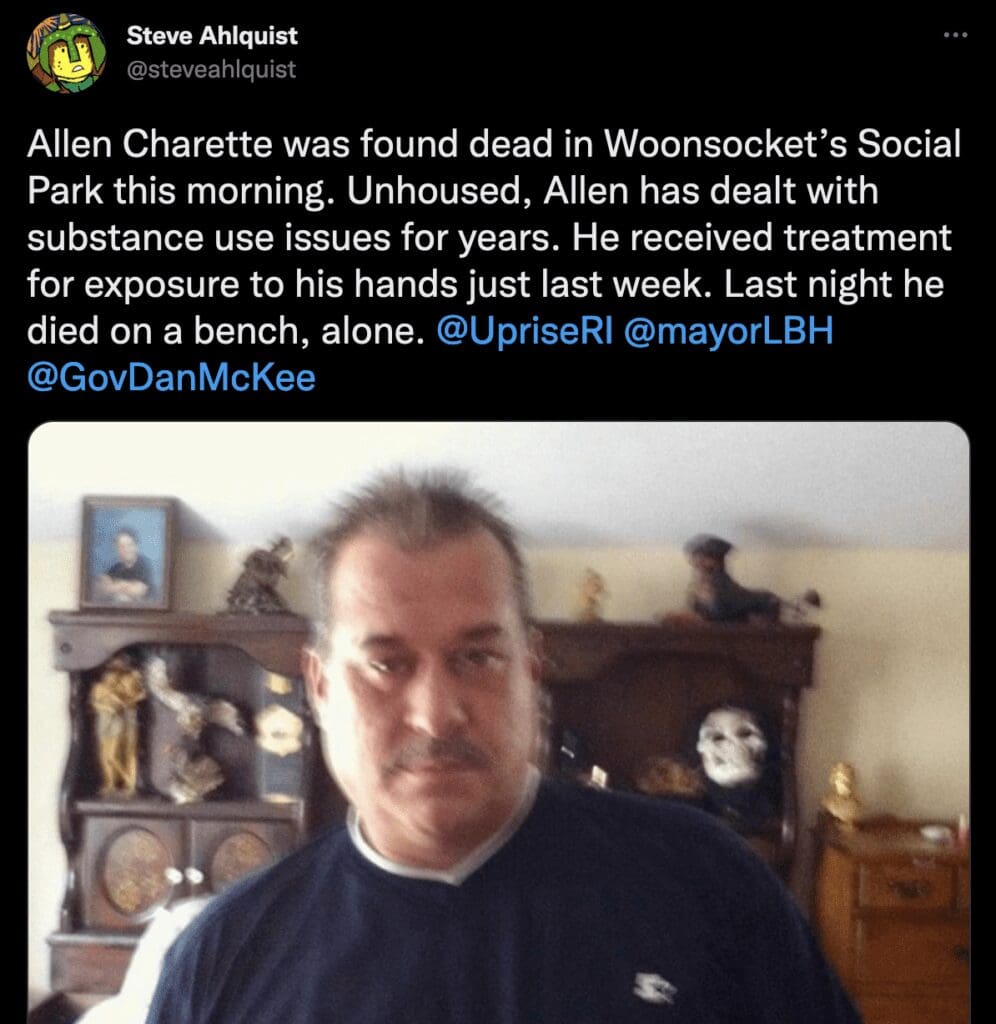
Ahlquist originally had a photo of Charette dead on the park bench, but his family asked that it be taken down.
Woonsocket was the latest community to have a homeless encampment removed. Those living in tents had been given notice several times that they would no longer be allowed to stay – some had secured other resources and some tents that were removed were no longer being lived in.
See RINewsToday story here:
UpriseRI has also said that “unhoused people are reporting that members of the Woonsocket Police have been told to allow no one to pitch any tents anywhere in Woonsocket on public property.”
The President/CEO of Community Care Alliance in Woonsocket, Benedict F. Lessing, Jr. said, “This is simply a continuing tragedy and preventable. We need to get to solutions, the first being more shelter resources as well as more accessible resources such as the CODAC Mobile Treatment Van. Anyone living outside is 10 times more likely to have serious health and behavioral health conditions and die than people in shelters and the general population. We can do better.”
In Warwick a woman in her 50s was found dead in the grounds area of T. F. Green Airport near Post Road. She was identified but no cause of death has yet to be released, or if she had been homeless. About two years ago another woman died close to that spot who was homeless.
___
CODAC Mobile Treatment Van in Woonsocet
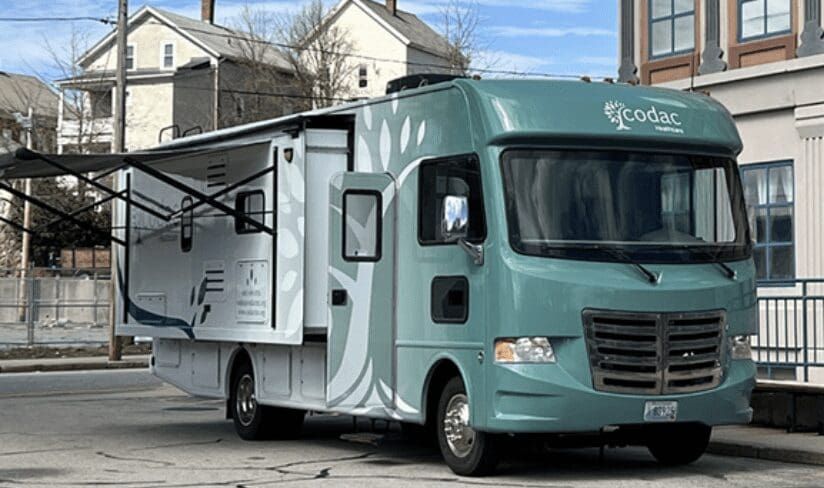
There have been several news reports that the mobile treatment van is not allowed to stay in the parking lot of the CCA, as it expanded its service days without approval. The CODAC staff have boldly said they were not going anywhere..
Lessing, of CCA commented: “Given the opioid and homeless crisis in Woonsocket, CODAC’s Mobile Treatment Van has become another important resource for dispensing lifesaving medical services. The Van is serving over 40 individuals daily, many of whom are homeless.” The $300K van was funded by Champlin Foundation. The van began in September in the parking lot of the Community Care Alliance where it is from 6:30am to 10am, where they began with approximately 70 patients on a regular basis. Sources say the agencies and the city may be close to an agreement on how services can continue.
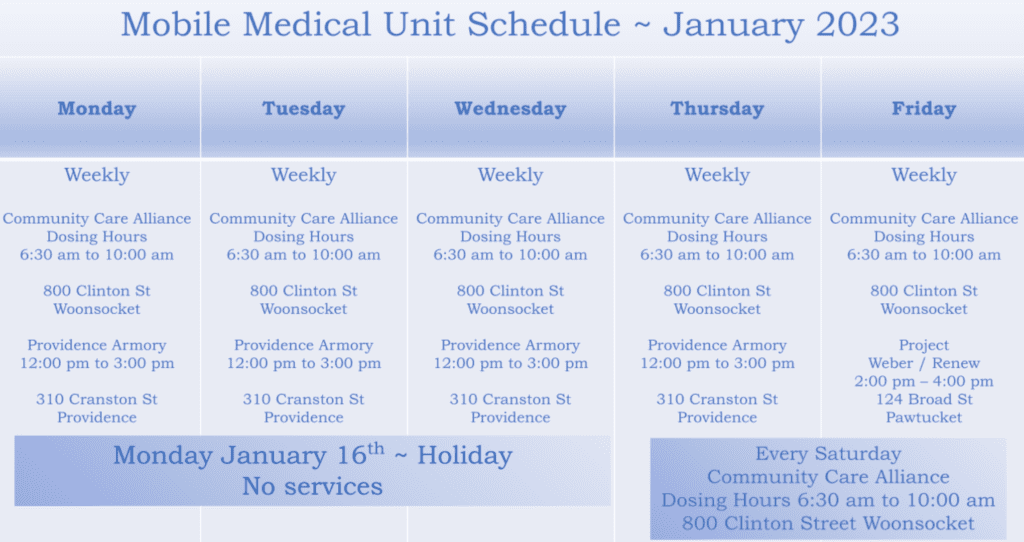
___
Pawtucket – at long last
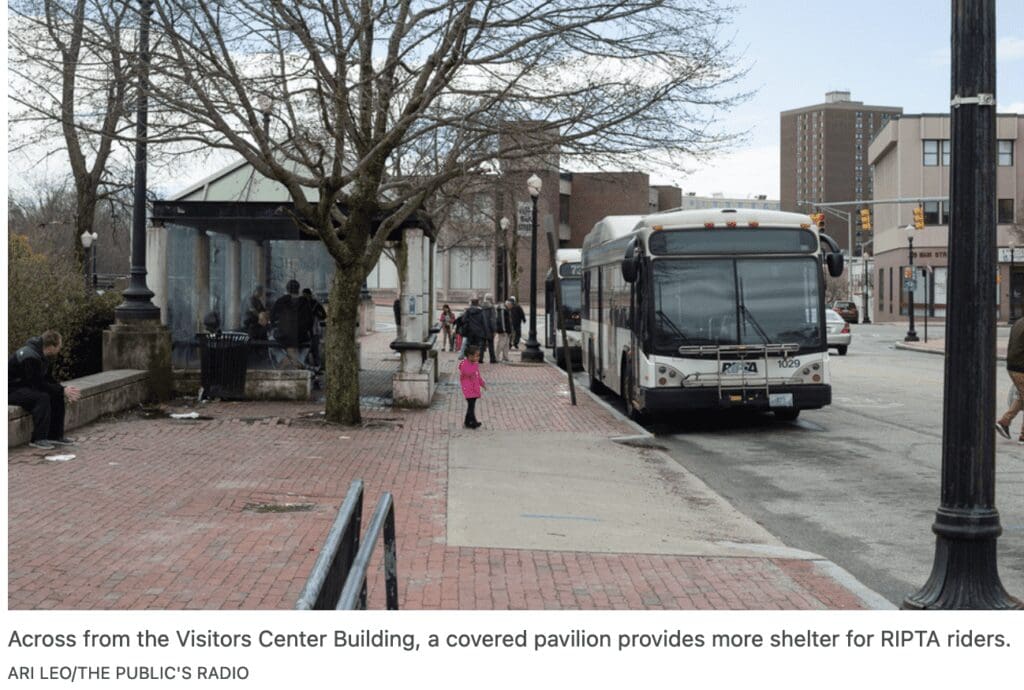
Locally businesses and community agencies are hopeful to see the bus shelter area on Roosevelt area being removed now that the bus hub will be relocated to the newly opened Pawtucket/Central Falls Train Station. These areas line the end of Roosevelt that connects to Main Street and encourage homeless to sleep in the area, some for several years. Groups who feed the homeless also can be seen taking food out of their trunks in this no-parking area and individuals gathering.
The Blackstone Valley Tourism group and local stores and walkers to them will notice the difference as those who linger who may not be bus riders at all will no longer have a sheltered area. Will they move over to the new train station? Pawtucket needs to have a plan to address that before it happens, as it seems inevitable. Pawtucket is still saying as we approach February that they will be opening a homeless shelter, but nothing has been announced.
___
Cranston
Several reports of 6 or more colorful tents in the woods behind the Shaws’s area of Chapel View and in sight from Route 37 have been reported to officials. This encampment hasn’t been this large as in previous years. We will follow up on this situation.
___
Westerly
Yes, there are homeless everywhere in Rhode Island. The Warm Center, which serves Westerly and southernly points is asking for small hotels and motels that may wish to sell to contact them so they can see if the buildings might be appropriate for homeless shelters on an emergency basis.
___
Budget – what is being planned for FY 2024?
$30 million for homeless emergency shelters were included in the Governor’s budget labeled “RI Ready”. Specifically, $30 million to expand shelter capacity to better meet the needs of individuals experiencing homelessness. Community advocates have expressed concern as to what this means for 2024 – and are Pallet Shelter villages headed for their community. With shelters not being the long term solution, the state seems to be anticipating that homelessness will not be substantially lessened next winter. But budgeting now both in this line item – and – with affordable housing in general will provide the new department and director with assets to address the growing problem.
___
Cranston Street Armory
The Cranston Street Armory continues to be straining at capacity, on many cold nights exceeding 200. Fire regulations have already expanded from 90 to 150, but the people continue to come – some for a day or so, some staying for much longer as social services begins to work with them on individual solutions.
Update: Eileen Hayes, of Amos House asked that the numbers be corrected and provided us with this statement: “The Cranston Armory has never had more than 193 individuals staying in the facility. We have never been over 200.”
Note: The numbers difference may be in those who “stop by” for services as compared to sleep over on a regular basis.
Rescue runs continue multiple times a day, and those taken to the hospital with overdoses usually return to the shelter in a day or so. On Martin Luther King, Jr. Day a “Day of Service” was completed at the Dexter Park & Training Grounds by community volunteers, cleaning up the park and Armory area of trash and photos were posted that include used needles.
Within walking distance of the Armory are luxury apartments being developed and now ready for viewing and renting. There are 12 units, all 2 bedrooms, ranging in rents from $2795 to $4200. This is just one of several high end rental developments planned for the “new, highly desirable West End”.
How will these luxury developers push the agenda of affordable housing in this traditionally low-income area with a higher than average percentage of people living in poverty?
Update: Sen. Sam Bell confirms that the state will fund professional trash cleanups in the area around the Armory, where litter and spent needles have become an increasing problem.
___
Update: The ACLU of RI and the RI Center for Justice announced today that they were not appealing Judge David Cruise’s decision last month allowing for the removal of the homeless encampment protest that took place at the State House. The ACLU says they are maintaining contact with other encampment groups.
___
Pallet Shelter Vendor expanding
Since the potential use of Pallet Shelters was mentioned in 2021 and 2022, the company’s products has exploded on the states’ market. Shelters have expanded to 10 states with over 65 separate locations, some of them “villages” where multiple shelters and ancillary buildings are added.
Now, in addition to the individual shelters, the company offers a bathroom shelter, a community room shelter, and shelters designed for as many as 4 people. However, Katya Hill, the company’s communications person says, “We’re very clear: This is not a home. It looks like a shelter. We don’t want it to look like a tiny home, because it’s not a home.”
Building small villages seems to be the trend in pallet shelter housing. In an article in Fast Company – “To support those most vulnerable people, Alabama’s largest city is launching a temporary housing pilot for some of its homeless population. It will construct small villages of “micro shelters” for people to reside in while they seek more permanent places to live.” This new shelter village in Birmingham, Alabama, will serve some of the nearly 1,000 people experiencing homelessness in the area with fifty 64-square-foot shelters, five accessible restrooms, and three community rooms. The 12-month pilot program is budgeted at $985,000 to begin.
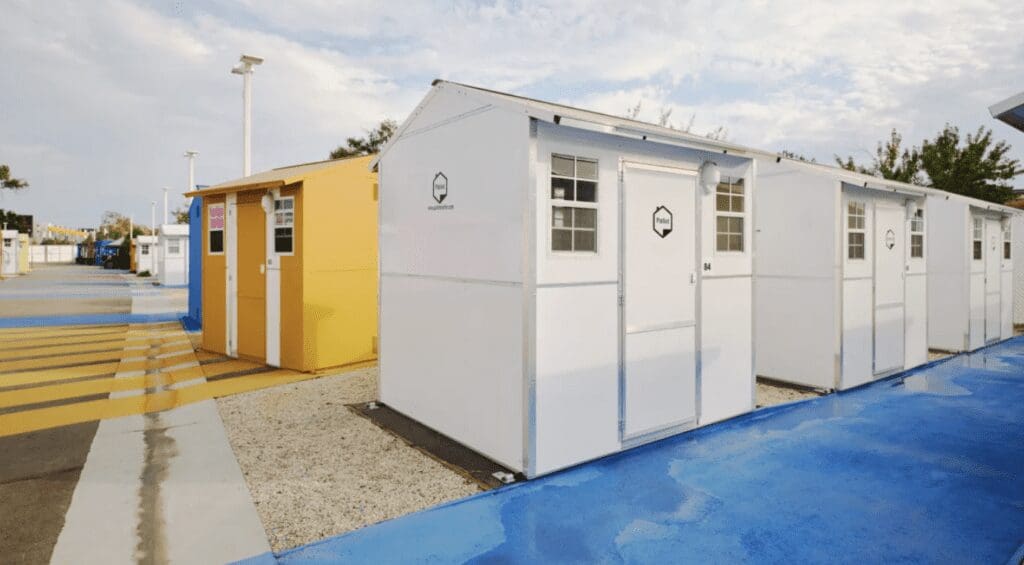
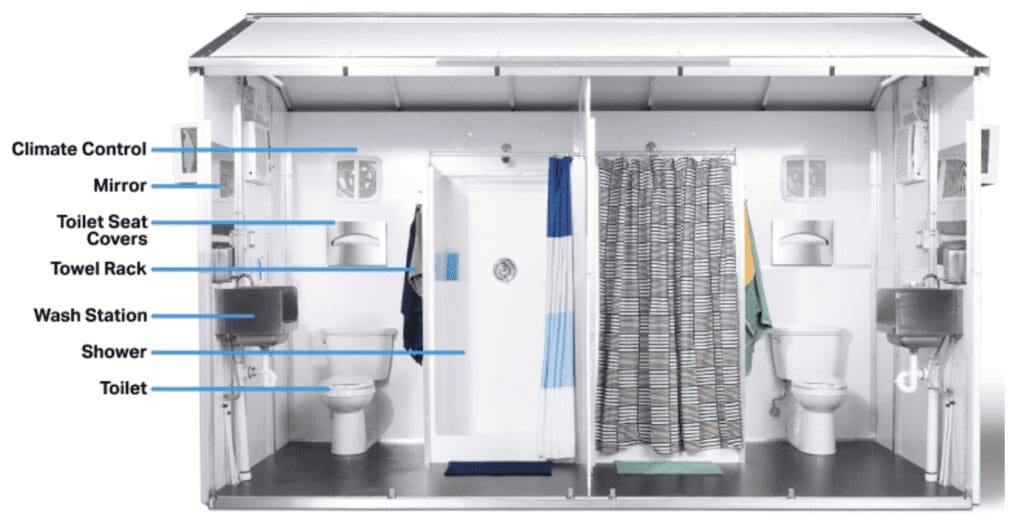
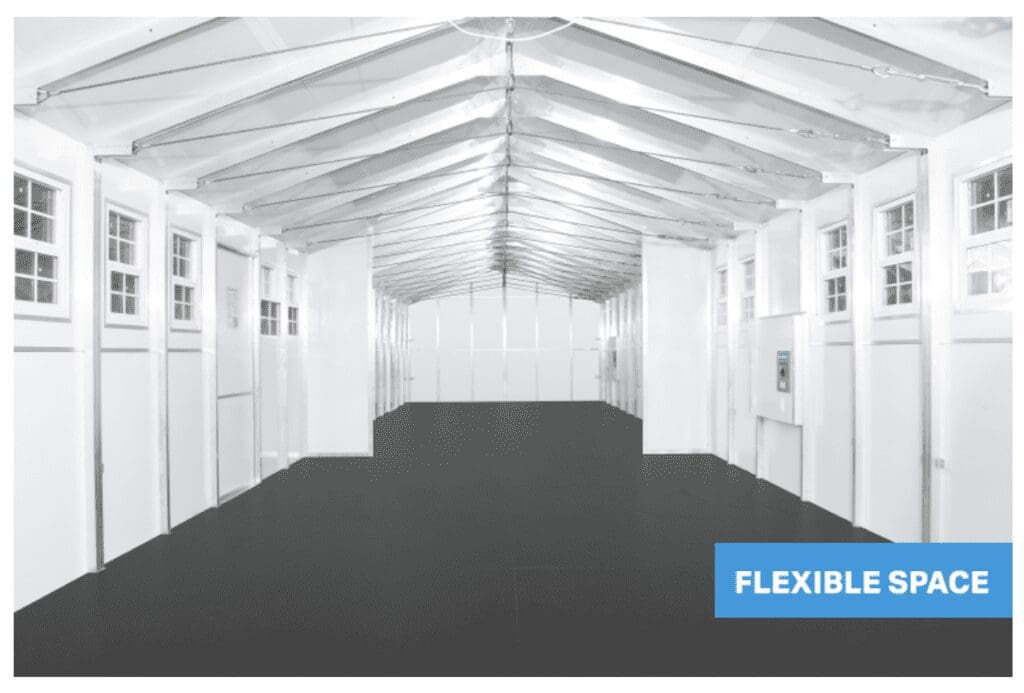
Pallet Shelters for those with pets
Pallet Shelters for homeless people with pets is also becoming a thing. In Colorado the local humane society partnered with a homeless service agency to open 10 pet friendly pallet shelters for those with pets. The effort, called “Homeward Hounds,” involves 8-feet by 8-feet “pallet shelters,” which will be climate controlled and located inside a fenced and badge controlled area of the shelter village.
Funding for the shelters was provided via a $149,000 grant from PetSmart Charities, according to the release, as well as support from other local funders. A pet pantry with pet food and supplies, and free pet vaccines administered by the humane society will be available to pets in the program.
“The human-animal bond is so crucial and being able to keep a pet out of our animal shelter while preserving that bond and literally keeping people from freezing to death in the process is pretty incredible,” said a humane society representative.
__
Hartford Avenue shelter for couples
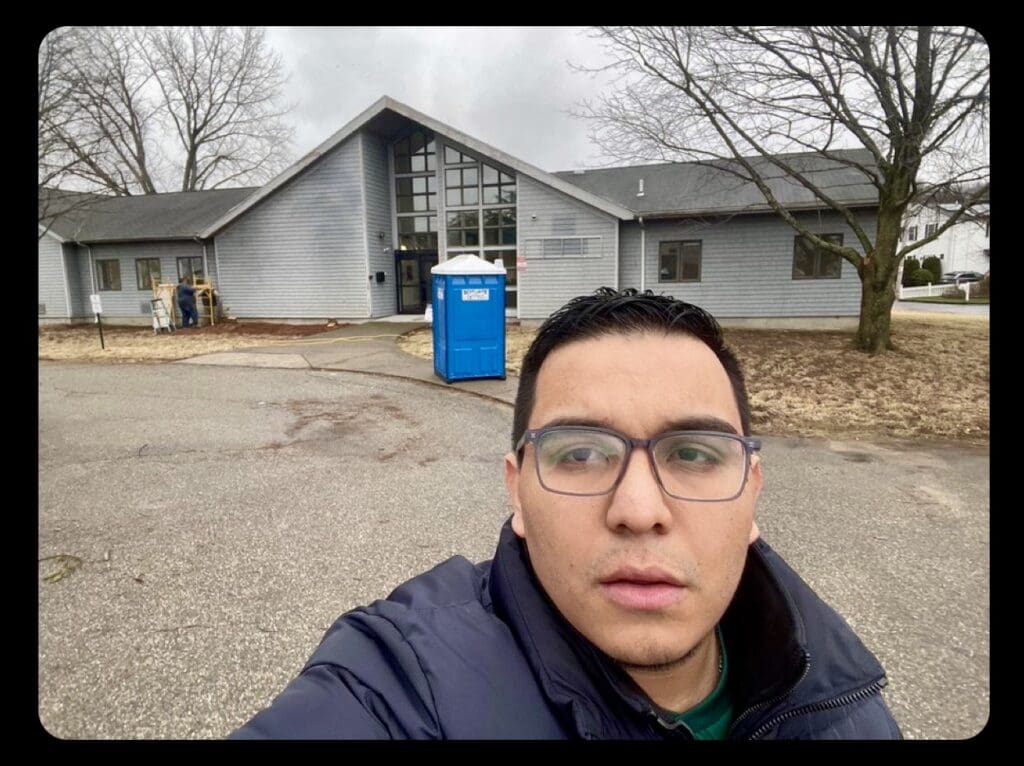
This is the shelter about to be opened in the Hartford Park neighborhood of Providence. It was formerly a treatment center owned and run by BHDDH. It is set way back from the street and backs up into a residential community. “While our most urgent priority is ensuring the health and safety of our shelter guests, we are equally focused on providing shelter guests with support and resources to find permanent housing,” Crossroads CEO Karen A. Santilli said in a statement to Providence Business News: “Crossroads will have housing problem solving teams available to work with adults at the Hartford Avenue Shelter. We … appreciate the state’s investment and creative use of state property to open this emergency shelter.” The shelter is scheduled to open this week or next.
___
New leadership team coming to Rhode Island homeless problem as Housing Czar Saal exits
Governor Dan McKee has nominated Stefan Pryor to serve as RI’s Secretary of Housing and Chairman of the Board of RI Housing. Pryor was formerly head of CommerceRI, resigning to run for state treasurer and losing in the primary. He will oversee the State’s housing efforts, establish the State’s new Department of Housing, and position the Department to fulfill the Administration’s vision of increasing housing opportunities to serve all Rhode Islanders – across income levels and communities. Also appointed is Hannah Moore, who previously served the state of Rhode Island as Assistant Secretary of Commerce, as the Executive Director of the Housing Resources Commission.
They will work to bring together an effective housing organization, and start by “listening to everyday Rhode Islanders, state and local leaders, and housing professionals and advocates regarding our current challenges as well as the ways we can propel our state forward”.
UPDATE: Rep & Sen submit bill to use Medicaid waiver funds
With the homelessness crisis making headlines in Rhode Island and around the country, Sen. Josh Miller and Rep. David Bennett are hoping Rhode Island will explore a new approach. Legislation they’re sponsoring would create a pilot program testing the effectiveness of using Medicaid waiver funds to provide the chronically homeless with housing.
The idea: chronically homeless individuals are suffering and cost taxpayers thousands of dollars through ER visits, jail stays, and inpatient treatment. But without stable housing, they are very unlikely to recover. What if Medicaid could provide these individuals with housing, helping them get back on their feet and saving taxpayers money?
The bill directs the Executive Office of Health and Human Services (EOHHS) to commission Medicaid waiver funds for a pilot program covering supportive housing services to people suffering from chronic homelessness. The program would provide individuals with behavioral health services, case management, personal care and assistance services, home and community-based services and housing support services.
WPRO interview – Gene Valicenti and sen. Miller:

Just keep doing what you have been doing. Put all the solutions on the West Side. Those taxpayers don’t deserve nearly as much as Downtowners or East Siders! We’ve got them bracketed by Cross Roads on the South and The Armory on the West. By all means continue to make homelessness the #1 Priority of this City and State. Isn’t that where taxpayer dollars should go! I for one don’t want to see a single taxpayer dollar going for fighting graffiti, trash or crime.
JT
Lori is absolutely correct. There is no definition of affordable housing. When a tenant pays for their own utilities, i.e. gas, and electricity, the owners of these properties are paying the mortgage, water, and taxes. The rest is gravy, especially in the case of a tenement. They are still making a profit. If I wanted to pay $2000 for rent plus utilities, I’d buy a house of my own.
There needs to be some control over the developers. Everything they build is “high-end”. They never build anything for the most common denominator. They cover themselves by making a couple of apartments “affordable” but, falling under any guidelines if some make $4000 a month, and pay for their utilities, a rent of $1500 a month becomes unaffordable.
As Lori has stated, even $1500 a month is usually in a less desirable area. Nobody who makes $4000 a month qualifies for a thing so add in those expenses and it becomes paycheck to paycheck. The landlords must think that everyone lives on social systems. It’s all about the money.
I worked on the streets of Prov , for 10yrs, serving our homeless population. I’ve heard all of the “fixes” but nothing ever changes.
There were 5000 homeless in RI then. Where does the money go? Crossroads admin?
Shelters are needed, but they are only temporary fixes. What is required is more desirable fair-income housing developments that don’t look like projects so people of all types can afford rent. Landlords are raping people for rentals because the state has no regulations for rent control. It has nothing to do with inflation. Landlords are free to gorge for their financial selfishness and gain. Most landlords are not friendly people either. A lot of places and the condition they are in are not worth the price they charge for most properties not up to snuff with most undesirable locations.
The state or government needs to get a grip and crack down on a mandatory 30% decrease in rents across the state and allow a maximum of 3% increase per year.